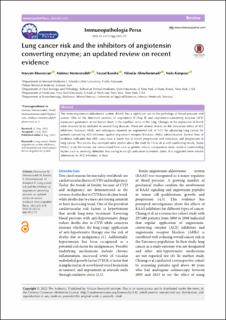Lung cancer risk and the inhibitors of angiotensin converting enzyme; an updated review on recent evidence
Peer reviewed, Journal article
Published version

View/
Date
2022Metadata
Show full item recordCollections
Abstract
The renin-angiotensin-aldosterone system (RAAS) has a significant act in the pathology of blood pressure and cancer. One of the dominant sections of angiotensin II (Ang II) and angiotensin-converting enzyme (ACE) expression generation in the human body is the capillary veins in the lung. Changes in the expression of RAAS were revealed to be included in several lung diseases. There are several studies on the anticancer effect of ACE inhibitors; however, Hicks and colleagues reported an augmented risk of 14% for advancing lung cancer for patients consuming ACE inhibitors against angiotensin receptor blockers (ARBs) administration. Several lines of evidence indicated that ARB users have a lower risk of tumor progression and metastasis and progression of lung cancer. This review has surveyed some studies about the study by Hicks et al with conflicting results. Some Hicks’s study limitations are summarized here such as genetic effects, comparative study, residual confounding factors such as smoking, detection bias owing to cough, and socio-economic status. It is suggested some natural alternatives to ACE Inhibitors in here.
